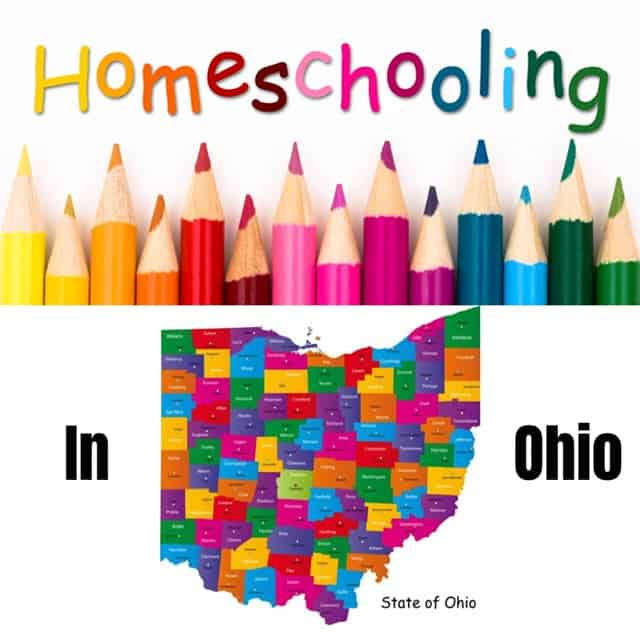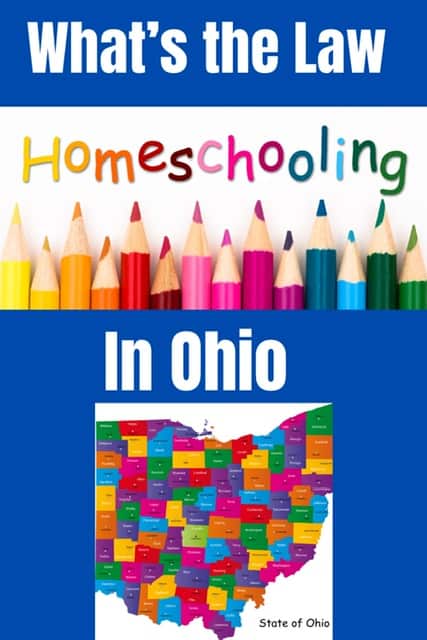Defining Homeschooling in Ohio
First, many times people will tell you they are homeschooling when they are not. I think this confusion comes because people do not understand what homeschooling is. They believe that if their child is at home and learning, they homeschool. This article intends to help you with homeschooling in Ohio and the law regarding teaching your children.
Homeschooling is parent-led and directed and is just one-way parents or guardians educate their children. Instead of sending your child to a traditional public school, private schools, or religious-based school, you may decide to teach your child at home. Homeschooling looks different for each family, and families choose this option for various reasons.
If your child is still enrolled in a public school, you are not homeschooling. Furthermore, if your child is enrolled in your local school system, you are not homeschooling. Your child is simply doing public school at home. If your child is enrolled in an online school and doing K-12 or another similar program, you are not homeschooling. Your child is enrolled in a charter school.
To be deemed homeschooled, you must have your child at home. You must purchase or put together the course of study, and be responsible for their education.

Why do parents homeschool?
First, one big reason for homeschooling is that parents want more flexibility regarding curriculum and schedules. Homeschooling allows families to direct their children’s education. This means you can target specific needs and interests rather than learning exactly what their peers are learning.
In addition, it is also more flexible when it comes to scheduling. For example, our family takes vacations when it works for our schedule, not the school schedule. Your family can work around your schedules rather than adhere to a school’s schedule.
This flexibility in schedules makes homeschooling attractive to people who don’t have traditional jobs. Furthermore, homeschooling may be a great option if you travel a lot for your career. Taking the entire family on a trip allows more family time than the school system allows.
Religious and educational reasons for homeschooling
Another great reason for homeschooling is for religious or educational reasons. This was our determining factor for choosing to educate our children at home many years ago. We wanted to have the ability to teach our children about God, Jesus Christ, and Holy Spirit all day long following the command in the Bible, Deuteronomy 6:6-7 “And these words which I command you today shall be in your heart. You shall teach them diligently to your children, and shall talk of them when you sit in your house, when you walk by the way when you lie down, and when you rise up.”

An individualized approach to education
We also loved the ability to provide an individualized approach to our child’s education. Homeschooling allows you as the parent to work at your child’s level, and instead of teaching grade-level material, you can educate your child at the level they are currently learning. This allows you to teach and use materials to meet your children’s learning styles, making it easier for them to learn.
Homeschooling can also provide a more sheltered or values-based education than some families may feel they can get in a traditional school setting. Parents may choose to homeschool to ensure that their children are taught in line with their religious or moral beliefs.
Furthermore, parents may want to keep their children out of school because of travel or work restrictions. Some parents can only take vacations during the normal school year and don’t want to be pulling their children out of school, especially in the high school years. Some parents worry about their child’s test scores for college entrance exams if they have taken them out of school for vacation. Homeschooling allows you and your child to do school when it is convenient for you.
However, homeschooling is not without its challenges. It can be time-consuming and require significant effort from parents, particularly if they are also working outside the home.
Homeschool parents may also struggle with the thought that they aren’t providing financially for their children if they only have one income. They may worry that their child will not have the same access to “expensive curriculum or high-end clothing” as their peers with two-income families.
Overall, homeschooling can be a successful educational approach for many families. Still, it requires careful consideration and planning to ensure that it is the right choice for both the parents and the children involved.
Homeschool Law in Ohio
Homeschooling is a popular and legal option in Ohio. While laws vary state-to-state, for this article, we are discussing Ohio. If you are considering homeschooling your child in Ohio, there are several laws and regulations that you should be aware of before getting started.
First, it’s important to understand the legal requirements for homeschooling in Ohio. According to Ohio law, homeschooling is permitted if you meet certain requirements. Ohio is known as a “moderate” state regarding homeschooling regulations, meaning that while there are some requirements to follow, the state allows parents the freedom to homeschool without much interference as long as the conditions are met.
Keep in mind that each state sets up their own regulations regarding homeschooling. Some states have almost no special requirements, while others are more stringent in what you must do to homeschool.

900 Hours to Homeschool in Ohio
Schooling for a minimum amount of hours per year is one requirement. To homeschool in Ohio, parents must provide 900 hours of instruction per year for each child. This can be broken down into any number of days or weeks as long as the total number of hours is met. Additionally, as the parent, you agree to teach the following subjects: (Not every subject has to be taught every year – for example, Ohio History can be taught one year or a little bit every year).
Language arts, reading, spelling and writing
Geography, history, History of the United States, and Ohio History. National, state and local government
Mathematics
Science
Health
Physical Education
Fine Arts including music
First aid, safety and fire prevention
Obviously math and reading are required subjects.
Submitting notification of intent to homeschool in Ohio
You must also submit an annual notification to your local school district with the child’s full name, address, and who will be teaching the child. Additionally, you need to state your intent to homeschool, along with a list of subjects that will be taught and a brief outline of the curriculum, and a list of educational materials, textbooks, correspondence courses, or other materials that will be used.
Ohio law also requires parents to submit an academic assessment each year. This means that homeschooled students participate in one of two options. The first is a standardized test. Those test scores will be submitted when you are notifying in year two and beyond. Examples of standardized tests include the CAT (California Achievement Test) or any other nationally approved test. Some scores will demonstrate reasonable proficiency in the subject matter. Unless your child has learning disabilities or hasn’t done any work through the year, they should easily be able to score high enough on an achievement test.
The second option is to have a written academic assessment done for your child by a certified teacher. This written narrative means that a certified teacher has reviewed your child’s work for the year and deemed it to be in “accordance with the child’s abilities.”
Again, this annual assessment does not need to be submitted at the beginning of year one but at the beginning of year two and beyond.
Who Can Homeschool in Ohio?
While homeschooling is legal in Ohio, some restrictions exist on who can homeschool. To legally homeschool a child in Ohio, the parent or legal guardian must have a high school diploma or GED. If the parent does not have a high school diploma or GED, they may still be able to homeschool their child by working with a licensed teacher or enrolling them in an online school accredited by the state. However, enrollment in an online school is not “homeschooling” but rather “public school at home.” Many online options, such as K-12, are charter schools that take public funds from your local school district if your child is enrolled.
Homeschool Notification in Ohio
Be aware that Ohio and your local school district superintendent do not “approve” you to homeschool. When you submit an intent to homeschool, you are to submit to your local superintendent. After the superintendent receives it, the district has 14 days to respond. Failure to respond in 14 days means they have given up their right to ask for additional resources. When they respond to your notification, they are to excuse or not excuse your child from attendance in school based on the information provided.
The notification process must occur each year from when your child is 6 to 18 years old. The compulsory school attendance age for Ohio is age 6. This means that before your child turns 6, State Law does not compel you to notify.
If you are considering homeschooling your child in Ohio, there are a few steps you can take to get started. The first step is to familiarize yourself with Ohio’s homeschooling laws and regulations found in the Ohio Revised Code 3321.04. This will ensure that you are following all of the legal requirements of Ohio law and will help you avoid any potential issues or conflicts with your local school district.
Choosing Curriculum to Homeschool
Once you have a good understanding of the legal requirements for homeschooling in Ohio, the next step is to choose a curriculum. Many different curriculum options are available for homeschooling families, ranging from pre-packaged curriculums that provide all of the necessary materials and lesson plans to more flexible options that allow parents to design their own curriculum based on their child’s individual needs and interests.
When choosing a curriculum, it’s important to consider your child’s learning style and interests. Some children may thrive with a structured curriculum that provides a clear plan for each day’s lessons, while others may prefer a more flexible approach that allows them to explore topics in greater depth. Many resources are available online and through homeschooling organizations that can help you choose a curriculum that is right for your child.
Another important consideration when homeschooling in Ohio is socialization. While homeschooling can provide many benefits, including greater flexibility and the ability to tailor the curriculum to your child’s needs, it can also be isolating if children do not have opportunities to interact with peers and engage in social activities. Fortunately, there are many homeschooling groups and organizations in Ohio.
Protecting Your Family While You Homeschool in Ohio
You may want to join an organization such as HSLDA (Homeschool Legal Defense Association). I should have used the lifetime option years ago but chose the yearly payment. Your yearly membership funds go to help represent other Ohio homeschoolers who may have truancy officers, school districts or even police officers show up at their doorstep.
While I have never had anyone show up at my door, I have had the pleasure of a phone call every few years requesting information I didn’t need to provide. These requests for additional detail often show up on the notification form that the school districts send. Remember, you do not need to provide additional information outside of what Ohio law requires. This means that your child’s social security number or your phone number do not need to be provided to your local school district.
HSLDA provides legal advice and even representation if you have a court case. This yearly fee offers peace of mind when home schooling.
I also make sure to leave off grade levels when I notify. You are not legally required to teach your 10 year old at a certain grade level. Much of the curriculum that I selected was not grade specific anyway.

What can my 900 hours look like?
Many parents wonder if they can include field trips, cooking, or grocery shopping in the 900 hours. Yes, of course, you can.
When your child is enrolled in a public school system in the State of Ohio, they will take some field trips during the school year. Those field trips are counted as school. A public school child may take home ec classes and learn how to cook. Why shouldn’t your child at home learn those same things. Additionally, making a grocery list, balancing a checkbook, woodworking, and even home repairs can all be counted toward the 900 hour requirements.
You as the parent get to determine your child’s course of study. As long as you are meeting the 900 hour requirement, you and your child are free to take courses that are non-traditional. For example, one year my daughter had a course in goat physiology and anatomy. This was something she felt passionately about and I created a science class for her based on her interest.
Another year, I had my son do a very non-traditional biology course. Everything he did was very hands on. He learned about genetics through breeding chickens for specific traits. He enjoyed learning in this manner instead of lectures.
What about extracurricular activity?
You, as the parent, can determine how much or how little you want your child involved in extracurricular activities. In fact, many activities are great for homeschool families. Consider 4-H, scouts, church groups, and even homeschool sports leagues. These organizations can be found in areas with homeschool populations.
One final note: Homeschool students tend to score higher on college placement tests. Furthermore, they also seem to have an easier time in college classes. This may be because they have learned how to do independent study. Much of college revolves around being self-directed.
Read More:
10 Tips to Stress-Free Homeschooling


Reviewing movies for parents from a Christian perspective since 2005. Know Before You Go!
Christian Homeschooling mom – 30 years and counting
Autism Mom & Disney enthusiast
